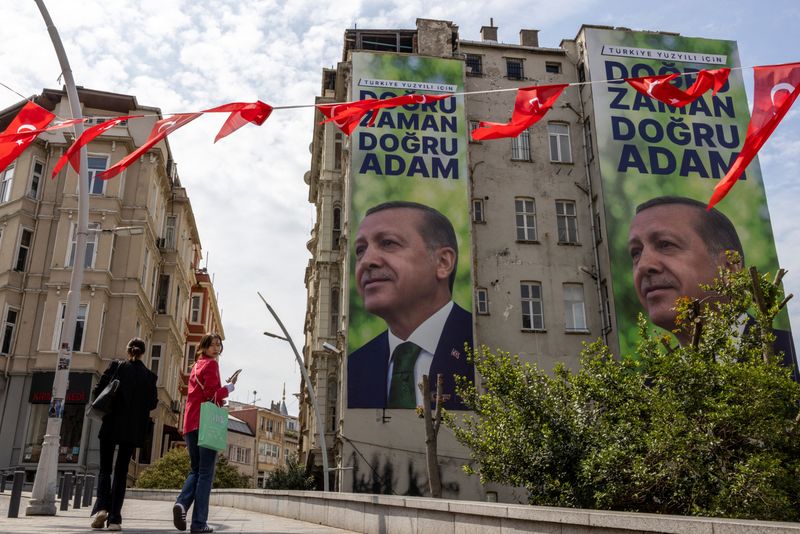Explainer-Turkey election 2023: What’s at stake in the runoff?
2023.05.26 03:44
2/2

© Reuters. People walk next to posters of Turkish President Tayyip Erdogan, ahead of the May 28 presidential runoff vote, in Istanbul, Turkey, May 25, 2023. REUTERS/Umit Bektas
2/2
(Reuters) – Turkish President Tayyip Erdogan aims to extend his rule into a third decade in an election on Sunday, with the momentum seen in his favour in the runoff vote after a first round showed him ahead of his challenger, Kemal Kilicdaroglu.
Already buoyed by a parliamentary majority won by his Islamist-rooted AK Party and its allies on May 14, Erdogan got another boost on Monday thanks to the endorsement of a nationalist politician who came third in the first round.
The election will decide not only who leads Turkey but also how it is governed, where its economy is headed, and the shape of its foreign policy. Kilicdaroglu, who received the endorsement of another far-right leader, is backed by a six-party alliance including his Republican People’s Party (CHP).
Modern Turkey’s longest-serving leader, Erdogan has championed religious piety and low interest rates at home while asserting Turkish influence in the region and loosening the NATO member’s ties with the West.
The election takes place three months after earthquakes in southeast Turkey killed more than 50,000 people.
WHAT’S AT STAKE FOR TURKEY …
The most powerful leader since Mustafa Kemal Ataturk founded the modern Turkish republic a century ago, Erdogan and his AK Party have shifted Turkey away from Ataturk’s secular blueprint.
Erdogan has also centralised power around an executive presidency, based in a 1,000-room palace on the edge of Ankara, which sets policy on Turkey’s economic, security, domestic and international affairs.
Erdogan’s critics say his government has muzzled dissent, eroded rights and brought the judicial system under its sway, a charge denied by officials who say it has protected citizens in the face of unique security threats including a 2016 coup attempt.
Economists say Erdogan’s calls for low rates sent inflation soaring to a 24-year high of 85% last year, and the lira slumping to one tenth of its value against the dollar over the last decade.
… AND THE REST OF THE WORLD?
Under Erdogan, Turkey has flexed military power in the Middle East and beyond, launching four incursions into Syria, waging an offensive against Kurdish militants inside Iraq and sending military support to Libya and Azerbaijan.
Turkey also saw a series of diplomatic clashes with regional powers Saudi Arabia, Egypt, the United Arab Emirates and Israel, as well as a stand-off with Greece and Cyprus over eastern Mediterranean maritime boundaries, until it changed tack two years ago and sought rapprochement with some of its rivals.
Erdogan’s purchase of Russian air defences triggered U.S. arms industry sanctions against Ankara, while his closeness to Russian President Vladimir Putin led critics to question Turkey’s commitment to the NATO Western defence alliance. Ankara’s objections to NATO membership applications from Sweden and Finland have also raised tensions.
However, Turkey also brokered a deal for Ukrainian wheat exports, underlining the potential role Erdogan has staked in efforts to end the Ukraine war. It is not clear that a successor would enjoy the same profile he has created on the world stage, a point he has made in the election campaign.
WHAT IS THE OPPOSITION PROMISING?
Two main opposition parties, the secularist CHP and centre-right nationalist IYI Party, have allied themselves with four smaller parties under a platform that would reverse many of Erdogan’s signature policies.
They have pledged to restore independence to the central bank and reverse Erdogan’s unorthodox economic policies. They would also dismantle his executive presidency in favour of the previous parliamentary system, and send back Syrian refugees.
They also aim to improve relations with Western allies including the United States, and to return Turkey to the F-35 fighter jet programme, from which it was blocked after buying Russian missile defences.
Analysts believe the policies promised by the opposition could spur foreign investment.
Erdogan supported failed efforts to topple Syrian President Bashar al-Assad, while hosting at least 3.6 million Syrian refugees who have become increasingly unwelcome at a time of economic hardship in Turkey.
Seeking a runoff boost from nationalist voters, Kilicdaroglu has in the last two weeks sharpened his anti-immigrant tone and promised to repatriate migrants.
JUST HOW CLOSE IS THE RACE?
Kilicdaroglu got 44.9% in the first round compared to 49.5% for Erdogan, reflecting solid support despite a deep cost-of-living crisis and polls which had shown Kilicdaroglu in the lead. Pollsters later pointed to an unexpected surge in nationalist support at the ballot box to explain the result.
Erdogan has said a vote for him will ensure stability after his alliance secured a parliamentary majority.
Turkey’s four-decade conflict with the militant Kurdistan Workers Party (PKK) has factored into the campaigning, along with the role of the mainstream Kurdish political parties.
While not part of the opposition alliance, the pro-Kurdish Peoples’ Democratic Party (HDP) fiercely opposes Erdogan after a crackdown on its members in recent years and has endorsed Kilicdaroglu.
Erdogan’s attacks against Kilicdaroglu have included accusations, without evidence, of him winning support from the PKK, which has waged an insurgency since the 1980s in which more than 40,000 people have been killed. Kilicdaroglu has denied the accusations.








